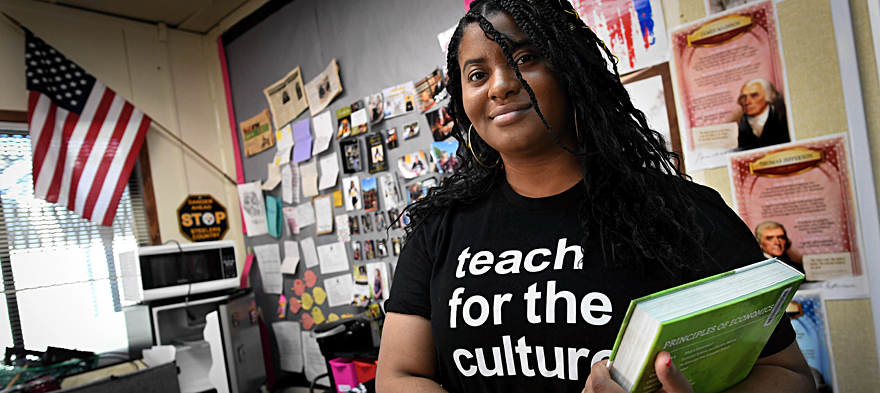
For many teachers, the end of the school year not only serves as an opportunity to deeply reflect on how the year went, but also a time to reevaluate whether our current schools are still the right fit for us. This is especially the case for Black teachers.
I know for a fact that the current political attacks on critical race theory have further unveiled the toxic racism that exists in many of our schools to the point where many Black teachers are reassessing their school’s commitment to racial justice and educational equity. If you’re a teacher who’s gone through that assessment and has decided to part ways with your school, I commend you for taking that first step! I know first-hand how difficult it is to walk away from the students and colleagues you love to prioritize your emotional welfare. It sounds selfish, but it’s actually selfless because you recognize that you can never be your best in a school where your voice and existence is constantly being suppressed.
As Black teachers, [pullquote]we’re good at fighting through our racial battle fatigue to still pour love into our schools, even when our schools don’t love us back.[/pullquote] Given the high number of Black teachers leaving the profession after a difficult year of pandemic teaching, it’s clearly evident that many of us have reached our breaking point and justifiably so. Leaving the profession is definitely one way to protect our peace but, if you’re someone who is still in the trenches and looking for a new teaching home that is truly committed to equity this summer, here are some important questions to consider when narrowing your search for a new school:
Ideally, it would be nice to have all the above questions answered but the truth is you won’t get some of those answers until you’ve spent an extended period of time working in the school. Even if you proactively reach out to current teachers and staff members for intel or review school climate data on the district website, you still won’t get all the answers you desire.
At the very least, these questions will give you a clearer idea of whether this potential teaching home will be a better fit. As you tighten up your resumes and engage in your job search, remember that [pullquote]the goal isn’t to find the “perfect” school but rather a school that values your Blackness and allows it to shine through.[/pullquote]
We fight so hard to create that space for your Black children. Now, we need to fight equally as hard to create that space for ourselves.
Kwame Sarfo-Mensah is the founder of Identity Talk Consulting, LLC., an independent educational consulting firm that provides professional development and consulting services globally to educators who desire to enhance their instructional practices and reach their utmost potential in the classroom. He is the author of two books, "Shaping the Teacher Identity: 8 Lessons That Will Help Define the Teacher in You" and his latest, "From Inaction to 'In Action': Creating a New Normal for Urban Educators". Throughout his 14-year career as a middle school math educator, author, and entrepreneur, Kwame has been on a personal mission to uplift and empower educators who are committed to reversing the ills of the public education system in America and around the world. As a staunch ambassador and advocate for teacher empowerment, Kwame has spoken at numerous national education conferences and worked diligently to support the recruitment and retention of teachers of color in the education system. In January 2019, he was one of 35 Massachusetts teachers of color chosen by Commissioner Jeff Riley to be in the inaugural cohort of the InSPIRED (In-Service Professionals Increasing Racial and Ethnic Diversity) Fellowship, an initiative organized by the Massachusetts Department of Elementary and Secondary Education for veteran teachers of color to recruit students of color at the high school, undergraduate and graduate levels to teach in targeted districts within the Commonwealth of Massachusetts. As an InSPIRED Teaching Fellow, Kwame facilitated professional development workshops for aspiring teachers at universities such as Boston College, UMass Boston, and Worcester State University and has served as a guest speaker for non-profit teacher pipeline programs such as Generation Teach and Worcester Public Schools’ Future Teachers Academy. A proud graduate of Temple University, Kwame holds a bachelor's degree in mathematics and a master's degree in education. He was honored as the 2019 National Member of the Year by Black Educators Rock, Inc. for his unwavering commitment to the advancement of the teacher profession.
If you have a child with disabilities, you’re not alone: According to the latest data, over 7 million American schoolchildren — 14% of all students ages 3-21 — are classified as eligible for special...
The fight for educational equity has never been just about schools. The real North Star for this work is providing opportunities for each child to thrive into adulthood. This means that our advocacy...
The story you tell yourself about your own math ability tends to become true. This isn’t some Oprah aphorism about attracting what you want from the universe. Well, I guess it kind of is, but...
Your donations support the voices who challenge decision makers to provide the learning opportunities all children need to thrive.
Ed Post is the flagship website platform of brightbeam, a 501(c3) network of education activists and influencers demanding a better education and a brighter future for every child.
© 2020–2024 brightbeam. All rights reserved.